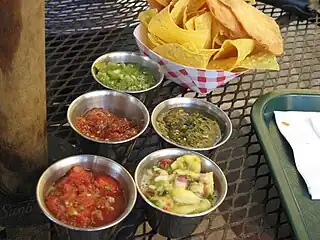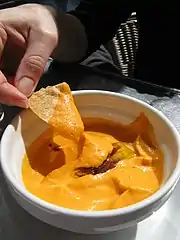.jpg.webp) Guacamole and hummus with tortilla chips | |
| Type | Snack food |
|---|---|
| Course | Appetizer, side dish |
| Serving temperature | Hot, cold, or room temperature |
.JPG.webp)
Chips or crisps are often served with dipping sauces; together they are referred to as chips and dip. Chips used include potato chips, tortilla chips, corn chips, bean chips, vegetable chips, pita chips,[1] plantain chips[2] and others. Crackers are also sometimes used,[3] as are crudités, which are whole or sliced raw vegetables. Various types of dips are used to accompany various types of chips. The dish may be served as a party dish, appetizer, hors d'oeuvre, or snack.
Chips and dip gained significant popularity in the United States during the 1950s, in part due to a Lipton advertising campaign for their French onion dip recipe, sometimes referred to as "California dip". Specialized trays and serving dishes designed to hold both chips and dip were created during this time. Chips and dip are frequently served during the Super Bowl American football game in the United States. National Chip and Dip Day occurs annually in the U.S. on March 23.
History
The earliest known recipe for something similar to today's potato chips is in William Kitchiner's book The Cook's Oracle published in 1817, which was a bestseller in the United Kingdom and the United States. The 1822 edition's recipe for "Potatoes fried in Slices or Shavings" reads "peel large potatoes... cut them in shavings round and round, as you would peel a lemon; dry them well in a clean cloth, and fry them in lard or dripping".[4][5][6]
The popularity of chips and dip significantly increased in the United States during the 1950s, beginning circa 1954, due to changes in styles of entertaining in the suburbs and also due to a Lipton advertising campaign based upon using Lipton's instant dehydrated onion soup mix to prepare dip.[7][3] The advertising campaign occurred on television and in supermarket display advertising, and promoted mixing the soup mix with sour cream or cream cheese to create a dip, to be served with potato chips or crudités.[7] This dip began to be called California Dip.[3] The advertising campaign realized significant success, and new, similar dip products were quickly developed thereafter.[7] During this time, unique platters designed for chips and dip service were created that allowed for the containment of several types of chips, and service variations were devised that included serving the dip in a bread bowl or hollowed-out fruit.[3]
Chips and dip are a popular food during the annual Super Bowl game in the United States.[8][9] Eighty-five percent of Americans eat potato chips.[10][11]
With corn-based chips
Chips and salsa, typically served using tortilla or corn chips,[7][12] is a common type of chips and dip dish that gained significant popularity in the United States in the late 1980s.[7] Chips and guacamole, also typically served with corn-based chips is another type, as well as chips and bean dip.[8] Seven-layer dip and tortilla chips is another corn-based chip combination,[1] as is chile con queso, an appetizer or side dish of melted cheese and chili pepper[13] typically served in Tex-Mex restaurants as a sauce for nachos.[14]
- Dips with tortilla chips
.jpg.webp)
 Tortilla chips and several salsas
Tortilla chips and several salsas
.jpg.webp)
 Spinach-artichoke dip
Spinach-artichoke dip
Double dipping
.jpg.webp)
Double-dipping involves biting a chip and then re-dipping it into a dip, which some people disapprove of, while others are indifferent. Double-dipping ostensibly transfers bacteria from a person's mouth into a dip, which can then be transferred to other consumers' mouths.[15] The term "double dipping," although it had existed since at least the mid twentieth century, was popularized in the 1993 Seinfeld episode "The Implant".[16]
In March 2013, Tostitos, a U.S. brand of tortilla chips and dips, hired the Ketchum communications agency to perform a survey concerning double dipping that polled over 1,000 Americans.[17] The survey found that 46% of male participants double-dip at a party, compared to 32% of females.[17] 54% stated that they would not consume dip after seeing another person double-dip, and 22% stated that they did not care.[17] 25% stated that they would verbally object to a person caught double-dipping.[17]
A study performed by the Department of Food Science and Human Nutrition at Clemson University claimed that three to six instances of double-dipping "would transfer about 10,000 bacteria from the eater’s mouth to the remaining dip," which corresponds with "about 50-100 bacteria from one mouth to another, in every bite."[18] The study's conclusion recommended that double-dipping should, in their opinion, be curtailed, including tips to prevent it from occurring.[18] The pH of the dip also affects the bacterial growth; higher acidity reduces the bacteria in the dip over time.[19][20]
A segment on MythBusters in 2009 tested how much bacteria is transferred during the process of double-dipping, finding that there is a transfer but that it, "adds only a few more microbes".[15]
National Chip and Dip Day
National Chip and Dip Day occurs in the United States annually on March 23.[10][21][22]
In popular culture
Double-dipping was used as a plot point in the Seinfeld episode "The Implant".[15][23] One of the main characters, George, argues at a funeral reception with his girlfriend's brother (Timmy) when he is accused of double-dipping a chip.[24] This episode inspired the 2009 segment on MythBusters.[15]
See also
References
- 1 2 Tal, R. & Houston, J. (2012). Fresh: New Vegetarian and Vegan Recipes from the Award-winning Fresh Restaurants. Wiley. ISBN 978-1-118-05690-5.
- ↑ Neil, Denise (February 12, 2015). "Review: Taste and See offers Wichita a global change of pace". The Wichita Eagle. Retrieved April 28, 2015.
- 1 2 3 4 Adamson, M.W.; Segan, F., eds. (2008). Entertaining from Ancient Rome to the Super Bowl: An Encyclopedia. ABC-CLIO. p. 303. ISBN 978-0-313-08689-2.
- ↑ McElwain, Aoife (June 17, 2019). "Did Tayto really invent cheese and onion crisps?". The Irish News.
- ↑ Berry, Steve & Norman, Phil (July 14, 2014). "Crisps buoyed Britain in its darkest hour". The Telegraph. Archived from the original on October 3, 2014. Retrieved August 26, 2014.
- ↑ Kitchiner, William (1822). The Cook's Oracle: Containing Receipts for Plain Cookery on the Most ... A. Constable & Company, Edinburgh, and Hurst, Robinson & Company, Cheap-sid. p. 208. OCLC 3878292. Archived from the original on November 15, 2017.
Potatoes fried in Slices or Shavings
- 1 2 3 4 5 McWilliams, M. (2012). The Story Behind the Dish: Classic American Foods. Greenwood. pp. 188–189. ISBN 978-0-313-38509-4.
- 1 2 "Tips on picking the right chips and dip". KOMO-TV. September 27, 2010. Retrieved April 29, 2015.
- ↑ Knowlton, Andrew (February 1, 2013). "Chips and Dip Etiquette, According to the Foodist". Bon Appétit. Retrieved June 8, 2015.
- 1 2 Esbenshade, Claudia (March 24, 2015). "Hey Chip! Monday was National Chip and Dip day". LNP. Retrieved April 29, 2015.
- ↑ "Grocery Store Traffic Booms for Super Bowl Sunday". KOLR. February 1, 2015. Archived from the original on March 6, 2015. Retrieved April 28, 2015.
- ↑ Lusk, J.L.; Shogren, J.F. (2007). Experimental Auctions: Methods and Applications in Economic and Marketing Research. Quantitative Methods for Applied Economics and Business Research. Cambridge University Press. p. 250. ISBN 978-1-139-46589-2.
- ↑ Laidlaw, Kim; Goodfriend, Wendy (January 28, 2015). "Cheese Please: Tex-Mex Chile Con Queso Dip For Your Super Bowl Party". Bay Area Bites. Retrieved February 25, 2016.
- ↑ Ellerbee, L. (2005). "Chile+con+queso" Take Big Bites: Adventures Around the World and Across the Table. Putnam's Sons. p. 75. ISBN 978-0-399-15268-9.
At most Tex-Mex restaurants, chile con queso is a bowl of dip made by melting American cheese with a few pieces of red ...
- 1 2 3 4 "Does double-dipping really spread germs?". Discovery Channel. April 11, 2012. Retrieved April 29, 2015.
- ↑ Kavalier, Fred (February 7, 2008). "Double dipping: the new challenge for health and safety". BMJ. 336 (7639): 297.2–297. doi:10.1136/bmj.39481.918090.C2. PMC 2234524.
- 1 2 3 4 Harris, Jenn (March 21, 2013). "A lesson in double-dipping for National Chip and Dip day". Los Angeles Times. Retrieved April 29, 2015.
- 1 2 Jarvie, Michelle (February 3, 2014). "Double dipping dangers". Michigan State University Extension. Retrieved April 29, 2015.
- ↑ Dawson, Paul (November 25, 2015). "Is Double-Dipping a Food Safety Problem or Just a Nasty Habit?". Scientific American. The Conversation.
- ↑ Trevino, Judith; Ballieu, Brad; Yost, Rachel; Danna, Samantha; Harris, Genevieve; Dejonckheere, Jacklyn; Dimitroff, Danielle; Philips, Mark; Han, Inyee; Moore, Chloe; Dawson, Paul (February 2009). "Effect of biting before dipping (double-dipping) chips on the bacterial population of the dipping solution". Journal of Food Safety. 29 (1): 37–48. doi:10.1111/j.1745-4565.2008.00137.x.
- ↑ Wierks, Kylee (March 23, 2015). "Tostitos celebrates National Chip and Dip Day by giving away free dip, sort of". WXIN. Retrieved April 29, 2015.
- ↑ Deschenes, S. (2014). Eat the Year: 366 Fun and Fabulous Food Holidays to Celebrate Every Day. Running Press Book Publishers. p. 99. ISBN 978-0-7624-5094-7.
- ↑ Dickson, Brian (October 28, 2002). "Seinfeld Scripts - The Implant". Seinfeld Scripts. Retrieved June 10, 2015.
- ↑ Fox, Jesse David (July 2, 2014). "Talking to the Seinfeld Writer Behind 'Yada Yada Yada' and 'Double-Dipping'". Vulture. Retrieved January 29, 2018.
Further reading
- Streeter, Leslie Gray (March 23, 2015). "Where to celebrate National Chips and Dip Day". Palm Beach Post. Retrieved April 29, 2015.
- Chip and dip tray U.S. patent. Publication number: US6152302 A.
External links
- Ray, Rachael (January 26, 2015). "7 'pass me the chips and dip' recipes". AOL.